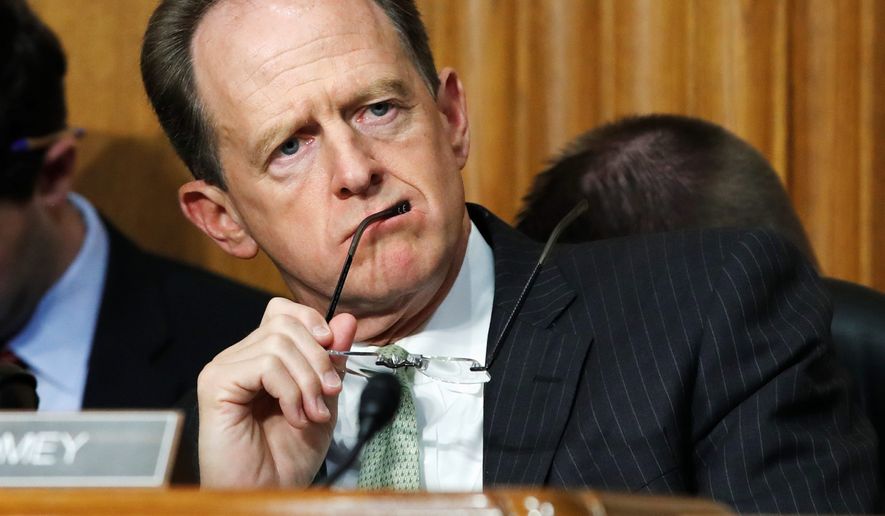Hoping to stop Democratic-led states from avoiding the consequences of the new tax law, the Trump administration’s proposed fix also could snare longtime allies such as the school choice movement.
The Treasury Department’s new rules take a “sledgehammer to a nail,” advocates said, clamping down on longstanding tax breaks states allowed for donations to land conservation funds, or for people who pay into funds to send poor kids to private school.
“The IRS could have narrowly targeted the bad actor states that were trying to save a buck for big donors, but instead they overreached,” said Leslie Hiner, vice president of legal affairs for EdChoice, a national school choice advocacy group.
The issue stems from last year’s tax cut law, which while lowering rates on corporations and individual taxpayers also limits some longstanding breaks. Among those is the state and local tax deduction, which the bill capped at a total $10,000 write-off.
High-tax blue states such as New York and New Jersey felt targeted and sought workarounds so their own funds would keep flowing, while shielding their residents from the federal taxman’s outreach.
They announced plans to allow wealthy taxpayers to effectively pay their state levies as charitable contributions — which then could be claimed on their federal returns.
The IRS said that’s not how it’s supposed to work, and proposed limits to charitable deductions. While the main target may have been the blue states, a number of charities are worried they’re covered.
There are 23 “tax-credit scholarship” programs in 18 states where taxpayers can get some kind of state credit in return for donating to nonprofit groups that, in turn, set up scholarships for largely lower-income children to attend private school, according to EdChoice.
Jared Walczak, a senior policy analyst at the Tax Foundation, said most taxpayers aren’t going to be affected by the new rules — but said perception can become reality when interest groups start accusing the government of tinkering with their prized tax shelters.
“These programs rely on not only the programs being financially attractive, but being widely perceived as financially attractive,” Mr. Walczak said. “And while the bottom line for federal tax liability is unchanged for most people, if expectations are to the contrary that’s an issue.”
Todd Hochrein, who runs an organization in Virginia that manages the exchange of land conservation tax credits, said clients already are weighing whether to move forward with land deals in light of the proposed charitable giving rules.
“Obviously, anytime you lower the financial incentive, you’re going to get some people who aren’t going to do it. That’s what we’re worried about,” he said.
Even lawmakers who helped write the $1.5 trillion federal tax cut law say they still have questions about how their states could be affected.
Sen. Pat Toomey, Pennsylvania Republican, said he’s had “extensive” conversations with the administration about the issue. He acknowledged that his state’s program, where businesses make contributions for private-school scholarships and receive tax credits in exchange, will likely feel at least somewhat of an impact.
“I do think there needs to be some further clarification about other items which I believe will be forthcoming, and at the end of the day I think the Pennsylvania program will be generally sound,” said Mr. Toomey, a member of the tax-writing Senate Finance Committee.
The Treasury Department so far has only proposed the rule, and Rep. Kevin Brady, the House’s top tax-writer, has urged states with charitable giving programs that predated the 2017 tax law to weigh in.
“This will be valuable as Treasury continues to work to preserve legitimate charitable programs while preventing tax evasion by some states,” the Texas Republican said.
The Democratic governors who pursued state and local tax workarounds this year, meanwhile, say they feel unfairly punished. New York, New Jersey, Connecticut and Maryland have sued the federal government over the tax law.
But some liberal groups cheered the Trump administration’s approach, saying its playing fair by also curtailing “overly generous” private school education credits.
“Private school supporters were hoping for a special carve-out that would allow their tax shelter to remain intact, but the IRS was correct not to pick winners and losers,” said Carl Davis, director of research at the left-leaning Institute on Taxation and Economic Policy. “All types of charitable credits should be on the same footing under federal tax law, and it seems that this regulation would close down the charitable tax credit dodge across the board.”
• David Sherfinski can be reached at dsherfinski@washingtontimes.com.




Please read our comment policy before commenting.